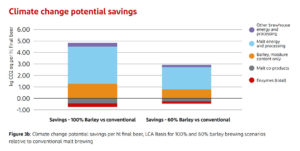LCA study shows that enzymes can play a crucial role in post-Covid-19 global climate fightback
COVID-19 could be the kickstart the climate fightback needs. Recovering from the pandemic provides a “profound opportunity” to make sure the world heads in the right direction to “tackle climate change, protect the environment, reverse biodiversity loss and ensure the long-term health and security of humankind,” according to UN Secretary-General António Guterres.
LCAs are becoming increasingly important in identifying ways to help solve the climate crisis — not only in pinpointing inefficiencies, but in highlighting how relatively small changes can create a huge, lasting, collective impact.
 It is something the Nutrition and Biosciences arm of DuPont has been looking at, as a way to establish the lifecycle impact of using its enzymes in the brewing process to reduce the overall environmental impact of making beer. The LCA evaluated the production of one tonne of boiled wort extract — enough to make around 97hl of beer — for two different cases: conventional brewing, using 100 percent malted barley; and 100 percent barley brewing using DuPont’s ALPHALASE AP4 enzyme solutions. The LCA revealed that by switching to barley brewing using the DuPont enzyme technology, brewers can achieve substantial environmental and cost savings. That’s because, by supplementing natural enzymes in the mash, ALPHALASE AP4 avoids the energy- and water-intensive malting process and boosts the conversion yield of barley to beer.
It is something the Nutrition and Biosciences arm of DuPont has been looking at, as a way to establish the lifecycle impact of using its enzymes in the brewing process to reduce the overall environmental impact of making beer. The LCA evaluated the production of one tonne of boiled wort extract — enough to make around 97hl of beer — for two different cases: conventional brewing, using 100 percent malted barley; and 100 percent barley brewing using DuPont’s ALPHALASE AP4 enzyme solutions. The LCA revealed that by switching to barley brewing using the DuPont enzyme technology, brewers can achieve substantial environmental and cost savings. That’s because, by supplementing natural enzymes in the mash, ALPHALASE AP4 avoids the energy- and water-intensive malting process and boosts the conversion yield of barley to beer.
Read more here.
